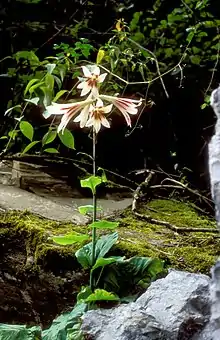Cardiocrinum
Cardiocrinum is a genus of bulbous plants of the lily family first described in 1846. They are native to the Himalaya, China, the Russian Far East, and Japan.[3] The bulbs are usually formed at the soil surface. The preferred habitat is woodland. The plants tend to be monocarpic, dying after flowering.[4]
| Cardiocrinum | |
|---|---|
 | |
| Cardiocrinum giganteum | |
| Scientific classification | |
| Kingdom: | Plantae |
| Clade: | Tracheophytes |
| Clade: | Angiosperms |
| Clade: | Monocots |
| Order: | Liliales |
| Family: | Liliaceae |
| Subfamily: | Lilioideae |
| Tribe: | Lilieae |
| Genus: | Cardiocrinum (Endl.) Lindl.[1] |
| Type species | |
| Cardiocrinum cathayanum | |
| Synonyms[2] | |
| |
Description
Cardiocrinum is a genus of monocarpic perennial herbs.[5]
Taxonomy
Cardiocrinum was originally described by Endlicher in 1836 as one of five sections of Lilium,[1][6] to which it is closely related. Later authors considered it a separate genus.[7] The common name is giant lilies. They differ from Lilium in some characteristics, most notably in the heart shaped leaves. The genus name alludes to these leaves, from the Greek kardia, heart, and krinon, lily.[8]
The Himalayan species Cardiocrinum giganteum is the largest of any of the lily plants, growing up to 3.5 metres high.
Species
The genus Cardiocrinum is endemic to East Asia and has three species, two of which occur in China.[7]
References
Bibliography
Books
- Bolt, Philip (2018). The Genus Cardiocrinum: its identification and cultivation (PDF). Redhall Garden.CS1 maint: ref=harv (link)
- Endlicher, Stephanus (1836). "Lilium (Cardiocrinum)". Genera plantarum secundum ordines naturales disposita (in Latin). Vienna: Fredericum Beck. p. 141.CS1 maint: ref=harv (link)
Articles
- Chen, Hong-Na; Zhao, Chun-Hai; Liu, Xiao-Rui; Liu, Jia-Xi (16 June 2012). "Pollen development of Cardiocrinum giganteum (Wall.) Makina in China". Plant Systematics and Evolution. 298 (8): 1557–1565. doi:10.1007/s00606-012-0658-9. JSTOR 43558355.
- Hyam, R. & Pankhurst, R.J. (1995). Plants and their names: a concise dictionary. Oxford: Oxford University Press. p. 89. ISBN 978-0-19-866189-4.CS1 maint: ref=harv (link)
- Lu, Rui-Sen; Li, Pan; Qiu, Ying-Xiong (10 January 2017). "The Complete Chloroplast Genomes of Three Cardiocrinum (Liliaceae) Species: Comparative Genomic and Phylogenetic Analyses". Frontiers in Plant Science. 7. doi:10.3389/fpls.2016.02054.
- Ohara, Masashi; Narumi, Tadashi; Yoshizane, Tomoko; Okayasu, Tarou; Masuda, Junzo; Kawano, Shoichi (December 2006). "7: Cardiocrinum cordatum (Thunb.) Makino (Liliaceae)". Plant Species Biology. 21 (3): 201–207. doi:10.1111/j.1442-1984.2006.00166.x.
- Pelkonen, Veli-Pekka; Pirttilä, Anna-Maria (2012). "Taxonomy and Phylogeny of the Genus Lilium" (PDF). Floriculture and Ornamental Biotechnology. 6 (Special Issue 2): 1–8.CS1 maint: ref=harv (link)
- Yang, Li-Qin; Hu, Hao-Yu; Xie, Chuan; Lai, Shan-Pan; Yang, Mei; He, Xing-Jin; Zhou, Song-Dong (January 2017). "Molecular phylogeny, biogeography and ecological niche modelling of Cardiocrinum(Liliaceae): insights into the evolutionary history of endemic genera distributed across the Sino-Japanese floristic region". Annals of Botany. 119 (1): 59–72. doi:10.1093/aob/mcw210.
Websites
- "Lilium unranked Cardiocrinum Endl.". Tropicos. Missouri Botanical Garden. 2019. Retrieved 10 September 2019.
- "Cardiocrinum (Endl.) Lindl". eMonocot. 2014. Retrieved 10 September 2019.
- "Cardiocrinum". Encyclopedia of Life. Retrieved 10 September 2019.
- WCSP. "Cardiocrinum (Endl.) Lindl., Veg. Kingd., ed. 2: 205 (1847)". World Checklist of Selected Plant Families (WCSP). Royal Botanic Gardens, Kew. Retrieved 10 September 2019.
- IPNI (2005). "Cardiocrinum". International Plant Names Index. Royal Botanic Gardens, Kew. Retrieved 10 September 2019.
| Wikimedia Commons has media related to Cardiocrinum. |
| Wikispecies has information related to Cardiocrinum. |